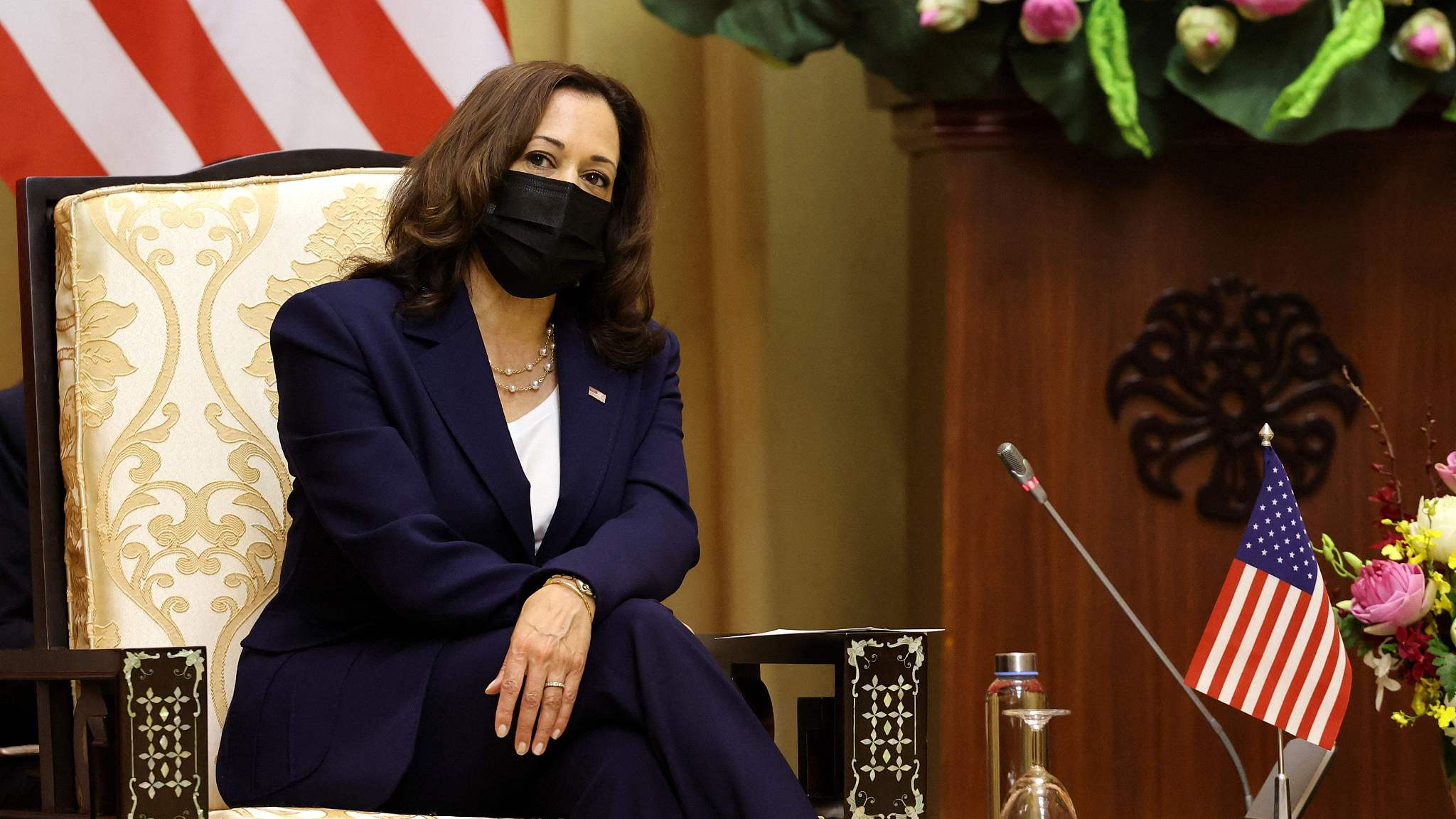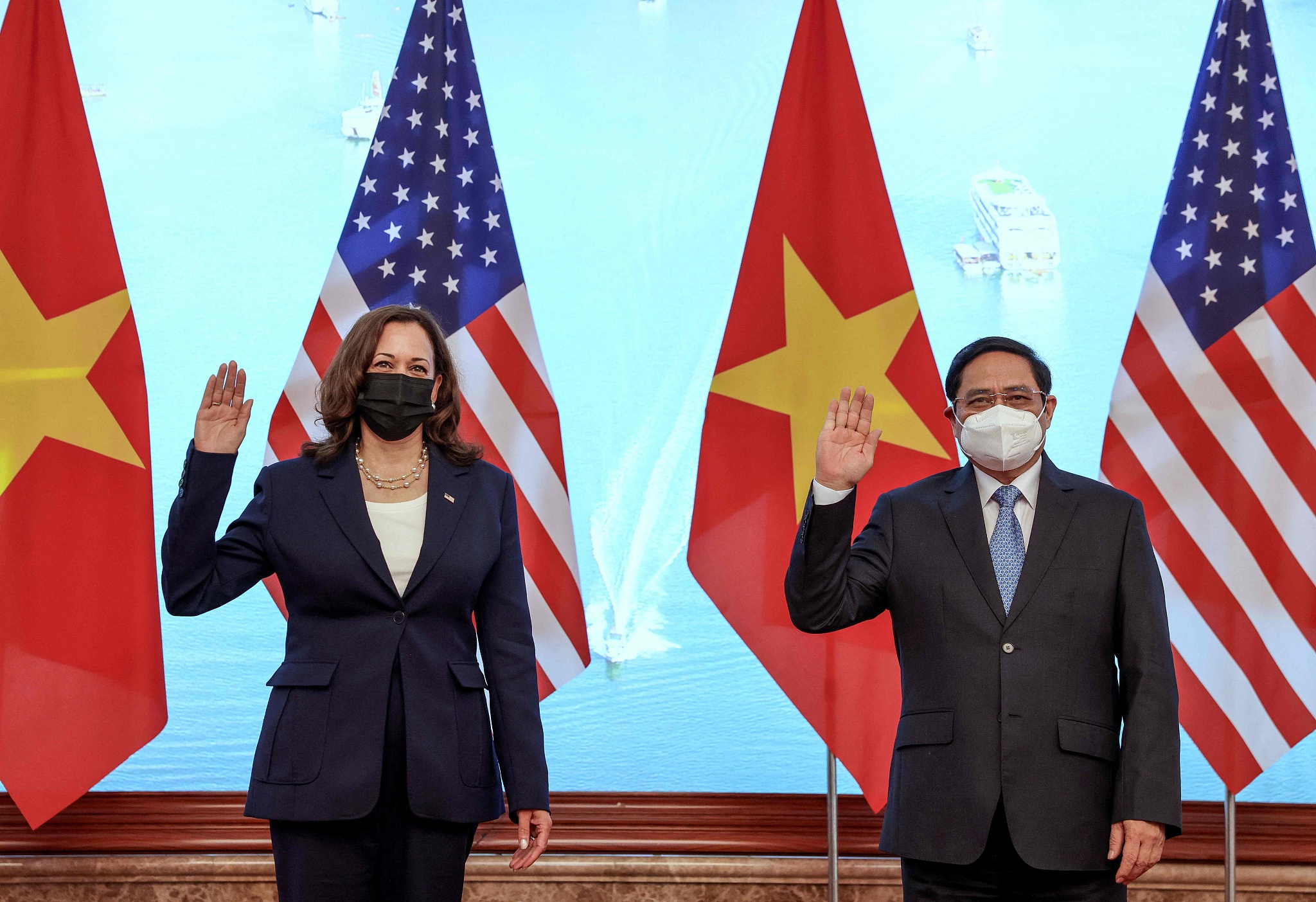
U.S. Vice President Kamala Harris in the Gold Room of the Presidential Palace, Hanoi, Vietnam, August, 25, 2021. /CFP
U.S. Vice President Kamala Harris in the Gold Room of the Presidential Palace, Hanoi, Vietnam, August, 25, 2021. /CFP
Editor's note: Keith Lamb is a University of Oxford graduate with an MSc degree in Contemporary Chinese Studies. His primary research interests are China's international relations and "socialism with Chinese characteristics." The article reflects the author's opinions and not necessarily the views of CGTN.
The failure of Afghanistan has rightly drawn parallels with the U.S. defeat in Vietnam. Despite the symbolism of the two events, which should be a wake-up call for Washington, the U.S., in the form of Vice-President Kamala Harris's visit to Hanoi, now seeks to upgrade U.S.-Vietnamese relations to a strategic partnership.
The purpose of this strategic partnership was not disguised by Harris in the least bit. The U.S. seeks to use Vietnam to prevent China's rise. To this effort, Harris brought up Sino-Vietnamese overlapping claims in the South China Sea (SCS) calling on Vietnam to "challenge China's excessive maritime claims."
However, on principle the U.S. cares not a cent for the multiple overlapping claims in the SCS beyond using it as a wedge, against China, to further its own geopolitical interests. In this dispute, China is just one claimant but clearly an unequal one when it comes to U.S. treatment.
The problem with China, for the U.S., is that it has been labeled as a peer competitor which threatens U.S. global hegemony. China is simply too successful and provides a competing model of development for countries in the Global South, which Vietnam is also part of.
Maybe some will swallow U.S. propaganda and believe that the U.S. opposes "bad" Communist China on principle. In this narrative, the U.S. simply wishes to protect "freedom" and human rights which have reached the "acme" in liberal capitalist systems.
However, if this principle was true then the U.S. would not be making overtures to Vietnam, itself a Communist state, which follows a similar political system to Beijing. After over a million deaths, due to the U.S. invasion of Vietnam, and over 200,000 deaths in Afghanistan, the Vietnamese will be more than cognizant of the results of U.S. "freedom."
The fact is, Vietnam, despite at times having neighbor issues with China, knows clearly the long-term historical trend that will see it, and the Global South, succeed.
In addition, Vietnam will be only too aware that should China fall the U.S. will once again attempt to destroy Vietnam. The U.S.' engagement with Cuba and Venezuela indicates exactly where U.S.-Vietnamese relations will descend to.
Indeed, the Victims of Communism Memorial Foundation, the prominent Washington-funded anti-China organization that has been instrumental in spreading anti-China lies, such as the genocide and slavery claims, also makes it explicitly clear that it seeks Vietnam's downfall. With this in mind, any pact Vietnam makes with the U.S. would be like feeding a friend to a crocodile only to save themselves for the next meal.

U.S. Vice President Kamala Harris (L) and Vietnam's Prime Minister Pham Minh Chinh meet in the government office in Hanoi, Vietnam, August 25, 2021. /CFP
U.S. Vice President Kamala Harris (L) and Vietnam's Prime Minister Pham Minh Chinh meet in the government office in Hanoi, Vietnam, August 25, 2021. /CFP
As the U.S. leaves Afghanistan, a conflict characterized by an absolutely one-sided zero-sum engagement that has enriched the liberal elites and impoverished an entire nation, Harris tried to induce Vietnamese support by claiming the U.S. didn't want "zero-sum" engagement but only supported peace and stability. However, simply put, "actions speak louder than words" and Vietnam is no fool.
Neither should Vietnam be taken in by Harrison's talk of the U.S. supporting the "rules-based order" which also takes extreme liberties with the truth. America's illegal wars are more than enough to dispel any myth that it cares about rules. In the case of the SCS, the U.S. has not even signed up to UNCLOS. As such, it has no legitimacy talking about rules that it does not subscribe to.
The fact is, the trend in Asia, which goes against U.S. interests, is that of peace and cooperation. For example, Vietnam, as part of ASEAN, joined the Regional Comprehensive Economic Partnership (RCEP). This trading block will cover around 30 percent of the world's GDP. This is an example that those with different systems can work together on real win-win projects and it is an initiative the U.S. should learn from.
Furthermore, Vietnam will greatly benefit from the Belt and Road Initiative which will interconnect China and South East Asia. Consequently, this will further act as a disincentive to solving matters through the use of the U.S. favorite strategy, namely the use of military hard power, which Vietnam could be drawn into.
Sino-Vietnamese cooperation will update Vietnam's colonial railway with a high-speed service allowing Vietnam to leapfrog the U.S. when it comes to basic infrastructure. This will increase tourism and allow for the integration of cross-border production chains.
At any rate, Vietnam will not have to bring up the innumerable contradictions in U.S. conduct and the many incentives for Asians cooperating together without the U.S. because any strategic partnership, which sounds too similar to a military one, violates Vietnam's "Three Nos" which include the principle of "no siding with one country against another."
(If you want to contribute and have specific expertise, please contact us at opinions@cgtn.com.)

